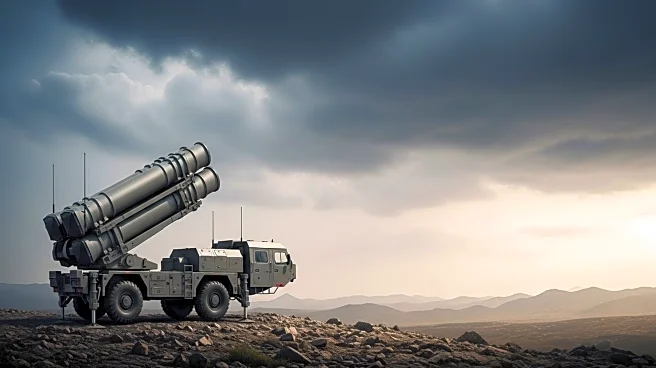What's Happening?
President Trump has issued a warning to Russia, suggesting that he may send long-range Tomahawk missiles to Ukraine if Moscow does not resolve its ongoing conflict with Ukraine. This announcement was made during a flight to Israel aboard Air Force One. Trump's comments followed a productive conversation with Ukrainian President Volodymyr Zelenskyy, where they discussed enhancing Ukraine's air defense and long-range capabilities. Russia has expressed significant concern over the potential U.S. provision of Tomahawk missiles, which could exacerbate tensions between the two nations. The situation is further complicated by recent Russian attacks on Ukraine's power grid, aimed at weakening Ukrainian infrastructure before winter.
Why It's Important?
The potential deployment of Tomahawk missiles to Ukraine marks a pivotal moment in U.S. foreign policy, potentially escalating the conflict and altering the balance of power in the region. These missiles would enable Ukraine to target deeper into Russian territory, increasing pressure on President Putin to engage in peace negotiations. For Ukraine, acquiring such advanced weaponry would enhance its defense capabilities and resilience against Russian aggression. However, this decision could strain diplomatic relations and lead to broader geopolitical consequences, affecting global stability and security.
What's Next?
A senior Ukrainian delegation is set to visit the U.S. this week, which may further discussions on the provision of long-range weapons, including Tomahawks. President Trump has expressed frustration with Russia's reluctance to engage in direct talks with Ukraine, suggesting a tougher stance may be necessary. The international community will be closely monitoring these developments, as any decision to supply Tomahawk missiles could provoke a strong response from Russia and impact ongoing diplomatic efforts to resolve the conflict.
Beyond the Headlines
The ethical implications of supplying advanced weaponry to Ukraine are significant, as it raises questions about the role of military aid in international conflicts. The decision could set a precedent for future U.S. involvement in foreign wars, potentially leading to increased militarization and arms proliferation. Additionally, the cultural and societal impact on Ukraine, as it continues to defend its sovereignty, highlights the resilience and determination of its people in the face of adversity.









